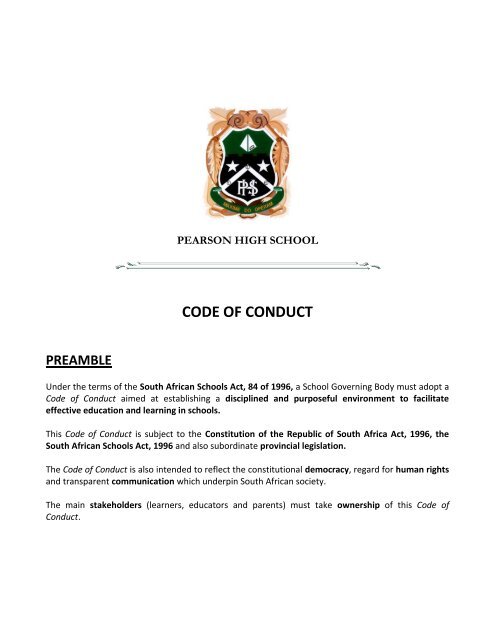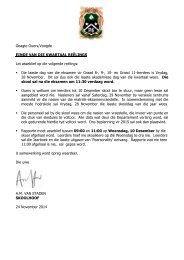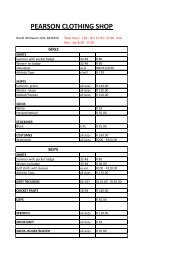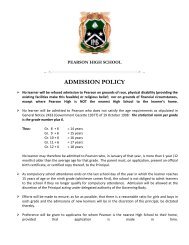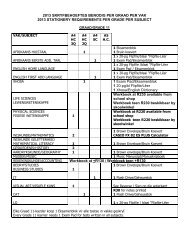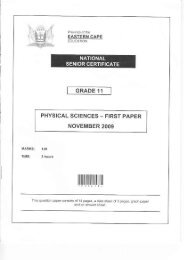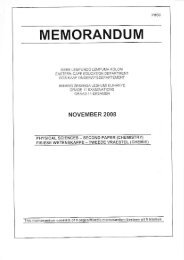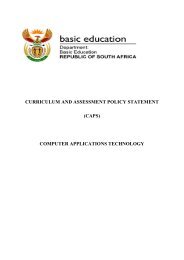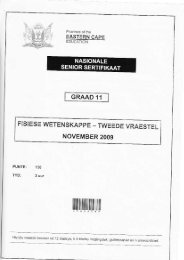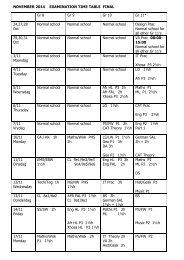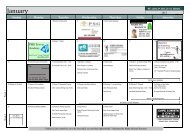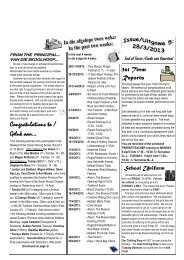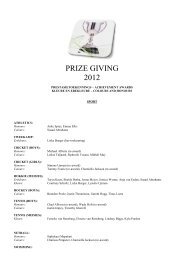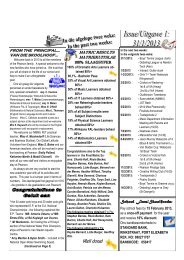Code of Conduct - Pearson High School
Code of Conduct - Pearson High School
Code of Conduct - Pearson High School
You also want an ePaper? Increase the reach of your titles
YUMPU automatically turns print PDFs into web optimized ePapers that Google loves.
PEARSON HIGH SCHOOLCODE OF CONDUCTPREAMBLEUnder the terms <strong>of</strong> the South African <strong>School</strong>s Act, 84 <strong>of</strong> 1996, a <strong>School</strong> Governing Body must adopt a<strong>Code</strong> <strong>of</strong> <strong>Conduct</strong> aimed at establishing a disciplined and purposeful environment to facilitateeffective education and learning in schools.This <strong>Code</strong> <strong>of</strong> <strong>Conduct</strong> is subject to the Constitution <strong>of</strong> the Republic <strong>of</strong> South Africa Act, 1996, theSouth African <strong>School</strong>s Act, 1996 and also subordinate provincial legislation.The <strong>Code</strong> <strong>of</strong> <strong>Conduct</strong> is also intended to reflect the constitutional democracy, regard for human rightsand transparent communication which underpin South African society.The main stakeholders (learners, educators and parents) must take ownership <strong>of</strong> this <strong>Code</strong> <strong>of</strong><strong>Conduct</strong>.
2PEARSONITES' BASIC CODE OF CONDUCT:Respect for authorityRespect for othersRespect for selfRespect for propertyRegular attendancePreparation for classesPunctualityMISSION STATEMENT:<strong>Pearson</strong> <strong>High</strong> <strong>School</strong> aims to be a sought-after school, achieving the highest possible educationalstandards and educating the whole child academically, culturally, spiritually and through sport tohis/her full potential, in order to become a useful and well-adjusted member <strong>of</strong> society.PHILOSOPHY:In striving to achieve this mission, the school is guided by the following philosophy:The maintenance <strong>of</strong> a Christian ethos, while at the same time instillingan awareness, knowledge, tolerance, appreciation and recognition <strong>of</strong> otherreligions.Inculcation <strong>of</strong> sound moral values.- Acceptance - Accountability- Compassion - Forgiveness- Perseverance - Self-control- Honesty - Responsibility- ToleranceDevelopment <strong>of</strong> sound social skills, emphasising:- the development <strong>of</strong> character, leadership qualities, physical fitness,cultural enrichment and aesthetic appreciation- respect for and awareness <strong>of</strong> the individual and his/her culture, language and religion- self-discipline through the acceptance <strong>of</strong> authority- responsibility for the consequences <strong>of</strong> one's actions- adaptability to change- the importance <strong>of</strong> good citizenship- dedication to high academic standards, by encouraging the development <strong>of</strong> skills and talents,the acquisition <strong>of</strong> knowledge, creativity and inquisitiveness and positive attitudes- the promotion and fostering <strong>of</strong> a culture <strong>of</strong> caring and <strong>of</strong> life-long learning at the school.The notion that every pupil must remember that he/she is a member <strong>of</strong> the school in public andprivate. All learners are expected to behave in a responsible, tolerant, courteous and sensiblemanner. Any action that is discourteous, dishonest or destructive or that may have a detrimentaleffect on the reputation <strong>of</strong> <strong>Pearson</strong> <strong>High</strong> <strong>School</strong> will be regarded as an <strong>of</strong>fence.
3RIGHTS AND OBLIGATIONS:The rights, obligations and expectations <strong>of</strong> learners, educators and parents are outlined over the nextthree pages.LEARNERSAny person enjoying a recognised right shall exercise or enjoy that right in a manner which will notinfringe upon the rights <strong>of</strong> any other person:LEARNERS' RIGHTS: Worth and dignity Protection from all forms <strong>of</strong> discrimination on the basis <strong>of</strong> race, colour, gender, language orreligion. The opportunity to learn in an environment conducive to the learning process. Freedom <strong>of</strong> speech and other forms <strong>of</strong> expression. The opportunity <strong>of</strong> being heard. An education that helps him/her to live his/her life to the full. Conservation and protection <strong>of</strong> their environment. Safety and good care. Due process in disciplinary matters.LEARNERS' OBLIGATIONS: Respect the dignity <strong>of</strong> the individual and show appropriate courtesy to elders and one another. Respect differences <strong>of</strong> race, colour, language, religion or gender in others. Ensure that the learning process <strong>of</strong> other learners is not unduly disturbed by his/her behaviour. Respect another's right to freedom <strong>of</strong> expression. Hear the other side. Make optimum use <strong>of</strong> the educational opportunities provided. Respect the natural environment. Respect another's right to safety. Be proud <strong>of</strong> his/her school. Obey the school rules.EDUCATORSAn educator at the <strong>School</strong> shall have the same rights as a parent to control and discipline learnersaccording to the <strong>Code</strong> <strong>of</strong> <strong>Conduct</strong> during the time the learner is in attendance at <strong>Pearson</strong> in anyclassroom there<strong>of</strong>, school function or school excursion or school-related activity.EDUCATORS' RIGHTS AND EXPECTATIONS:Learners will behave appropriately in the classroom so as not to interfere with others' learningand the educators' responsibility to educate.Learners will respect the dignity and fundamental rights <strong>of</strong> educators.
6- hairstyles- jewellery and/or nail-polish- uniform- school bags/casesHomework not done or incomplete, work not handed in on timeCopying homeworkWriting on desks or any school propertyLitteringBeing in out-<strong>of</strong>-bounds areasPoor attendance at sports practicesCATEGORY 2 – MORE SERIOUS OFFENCESRepeatedly committing less serious <strong>of</strong>fences.Use <strong>of</strong> cell phones during school timeDisorderly, insulting or insolent behaviour, e.g.- swearing,- lack <strong>of</strong> respect for authority or propertyDefamation <strong>of</strong> character, e.g- malicious gossip.Physical or emotional abuse.Absenteeism without reason.Failure to arrive at extra-mural activities without a valid reason.In possession <strong>of</strong>, or the smoking <strong>of</strong> cigarettes while under school jurisdiction, or in school uniform.Being in possession <strong>of</strong> objectionable reading matter or musical matter while under the jurisdiction<strong>of</strong> the school or in school uniform.Dishonesty: e.g- copying tests- missing tests or examinations without a valid reason.Disregarding and undermining a student leader’s authority.Tampering with computer system, e.g- misuse <strong>of</strong> internet- interference with another’s work- SettingsMisbehaviour in public while recognisable as a <strong>Pearson</strong> learner.Coming late for schoolCATEGORY 3 – SERIOUS MISCONDUCTA learner at <strong>Pearson</strong> <strong>High</strong> <strong>School</strong> who:- has been convicted by a court <strong>of</strong> a criminal <strong>of</strong>fice or has transgressed any other law uses or is under the influence <strong>of</strong> intoxicating liquor or drugs during a school activity is guilty <strong>of</strong> assault, theft, gross insubordination or immoral conduct has been repeatedly absent without leave from school and/or classes
7intentionally, and without just excuse:-- seriously threatens, disrupts or frustrates teaching or learning in a class- engages in a conspiracy to disrupt the proper functioning <strong>of</strong> the school- insults the dignity <strong>of</strong> a staff member- repeatedly cheats in a test or examination- distributes any test or examination material that may enable another person, or himself orherself to gain an unfair advantage- sexually harasses another person- is found in possession <strong>of</strong>, or distributes, pornographic material- supplies false information, or falsifies documentation to gain an unfair advantage at school- is in possession <strong>of</strong> a dangerous weapon, or uses a potentially dangerous item to threaten anyperson- engages in any act <strong>of</strong> public indecencyis party to harmful/humiliating initiation procedures involving learners endangers the safety and/or violates the rights <strong>of</strong> others fights, swears, or falsely identifies himself or herself threatens fellow learners or educators, or intimidates, victimises or bullies such persons uses hate speech, makes himself or herself guilty <strong>of</strong> racism or applies harmful graffiti vandalises, defaces or destroys school property repeatedly violates school rules, or the <strong>Code</strong> <strong>of</strong> <strong>Conduct</strong> conducts himself or herself in a disgraceful, improper or unbecoming manner that would bringdiscredit to the school deceit, including the forging <strong>of</strong> any persons signature any form <strong>of</strong> initiation fail to report any serious misconduct or fail to assist with the investigation <strong>of</strong> any seriousmisconduct. is found guilty <strong>of</strong> <strong>of</strong>fensive or oppressive behaviour takes computer equipment without permission being in possession <strong>of</strong> drugs or alcohol while under the jurisdiction <strong>of</strong> the school or in schooluniform.will, on the grounds <strong>of</strong> alleged serious misconduct, be referred to either an internal disciplinaryhearing or a formal Governing Body Disciplinary Hearing.SEARCHES:The Principal, or any other educator, upon reasonable suspicion (sufficient information), has the legalauthority to conduct a search <strong>of</strong> any learner or property in the possession <strong>of</strong> the learner fordangerous weapons, firearms, drugs, harmful or dangerous substances, stolen property, orpornographic material brought onto the school property. A search may be performed in terms <strong>of</strong> thefollowing Acts <strong>of</strong> general application:Control and Access to Public Premises and Vehicles Act, 53 <strong>of</strong>1985 Drugs and Drug-Trafficking Act, 140 <strong>of</strong> 1992 Arms and Ammunitions Act, 75 <strong>of</strong> 1969
8During a search, human dignity shall be observed and learners shall be searched in private by persons<strong>of</strong> their own gender, preferably in the presence <strong>of</strong> at least one other person. A record must be kept<strong>of</strong> the search proceeding and <strong>of</strong> the outcome. (Government Gazette no. 22545 <strong>of</strong> 2001 – “Regulationsfor Safety Measures at Public <strong>School</strong>s’.)NOTE:It will be the Principal’s prerogative to suspend a learner from attending school for aperiod <strong>of</strong> time if he/she deems this necessary for the safety or in the interests <strong>of</strong> otherlearners.B. CONSEQUENCES OF OFFENCES: Learners must recognise that they will be obliged to suffer the consequences <strong>of</strong>misconduct, as listed belowEducators and other disciplinarians, (student leaders, where applicable) will resolvedisciplinary problems which are not serious enough to be referred to the Principal.POSSIBLE PUNISHMENT:1. Verbal/written warnings2. Writing out <strong>of</strong> a passage3. Time-out chair4. Assignments and posters relevant to<strong>of</strong>fence5. Daily report system6. Calling in <strong>of</strong> parents by GradeHeads or Management Team7. Detention after school hours8. Community Service9. Service to the school10. Agreed affordable compensation, orthe replacement <strong>of</strong> damaged or stolenproperty11. Suspension from one or more schoolactivities and privileges12. Disciplinary hearingsDISCIPLINARY HEARINGS may be <strong>of</strong> two sorts:Internal Disciplinary Hearings- Will be conducted by members <strong>of</strong> the school’s Management Team, the appropriate educator,Grade Head, Head Boy and/or Head Girl.- To provide a mechanism to enable the school on a domestic and informal level to disciplinelearners and if necessary to implement punishment <strong>of</strong> a lesser order.- An internal Disciplinary Hearing could follow warnings, repeated occurrence <strong>of</strong> prior <strong>of</strong>fences,or when more serious transgressions have been committed.- The Internal Disciplinary Committee may impose a suitable punishment, or decide that thecase is serious enough to be referred to a Formal Disciplinary Hearing- The Internal Disciplinary Committee will submit its findings to the Principal.- There is no provision in this code for parents to be involved in the process.
9Formal Disciplinary Hearing- Convened by the <strong>School</strong> Governing Body- A Formal Disciplinary Hearing will be held where the <strong>of</strong>fence is one <strong>of</strong> serious misconduct (seepage 10) which can have been referred by an Internal Disciplinary Committee or where thelearner is in defiance <strong>of</strong> the internal Disciplinary Hearing.- THE PROCEDURE FOLLOWED MUST COMPLY WITH THE PRESCRIBED REGULATIONS, ASPRINTED IN THE PROVINCIAL NOTICE NO. 32 OF 25 JUNE 1999 – PROVINCIAL GAZETTE VOL. 6NO. 415 (EXTRAORDINARY).COPIES OF THIS NOTICE WILL BE MADE AVAILABLE ON REQUEST. THE COMPREHENSIVEFOUNDING DOCUMENT OF THIS CODE OFCONDUCT, CONTAINING FULL DETAILS OF PROCEDURES, IS AVAILABLE FOR INSPECTION ATTHE SCHOOL, ON REQUEST.DECISION TO INSTITUTE DISCIPLINARY PROCEEDINGS1. If a learner is accused <strong>of</strong> serious misconduct-(a)(b)the principal must immediately appoint an educator to investigate the alleged seriousmisconduct; anda committee <strong>of</strong> the governing body members, which members will not serve on thedisciplinary committee, must grant the learner a reasonable opportunity to makerepresentations to it regarding the alleged serious misconduct.2. If the committee <strong>of</strong> governing body members, after considering the representations made to itby the learner as contemplated in regulation 6(b), decides to suspend the learner ascontemplated in section 9(1) <strong>of</strong> the Act-(a)(b)(c)the governing body must, subject to section 9(1B) <strong>of</strong> the Act, conduct disciplinaryproceedings against the learner within the period stipulated in section 9(1A) <strong>of</strong> the Act;the investigator appointed in terms <strong>of</strong> regulation 6(a) must collect evidence related tothe alleged serious misconduct to be presented at the hearing contemplated inregulation 8(a); andthe investigator appointed in terms <strong>of</strong> regulation 6(a) must submit a written report tothe principal and to the governing body within two (2) school days <strong>of</strong> the learner beingsuspended, and may thereafter continue to collect evidence related to the allegedserious misconduct until the hearing contemplated in regulation 8(a) commences.
INSTITUTION OF DISCIPLINARY PROCEEDINGS103. If the governing body, acting in terms <strong>of</strong> section 9 (1A) <strong>of</strong> the Act, institutes disciplinaryproceedings against a learner-(a)(b)(c)the learner is entitled to a hearing to be adjudicated upon by a disciplinary committee;subject to regulation 10 and section 30(1)(a) <strong>of</strong> the Act, the governing body mustappoint a disciplinary committee, one <strong>of</strong> whose members must be designated by thegoverning body as the chairperson <strong>of</strong> the disciplinary committee; andthe principal must give the learner and the parent <strong>of</strong> the learner at least five (5) schooldays written notice <strong>of</strong> the hearing contemplated in paragraph (a) <strong>of</strong> this regulation.4. The notice contemplated in regulation 8(c) shall, in a manner that is comprehensible to thelearner and the parent <strong>of</strong> the learner and must substantially correspond with Form A -(a)(b)(c)(d)contain sufficient particularity <strong>of</strong> the date, place and nature <strong>of</strong> the alleged seriousmisconduct to enable the learner and the parent <strong>of</strong> the learner to identify the allegedserious misconduct in question and to respond thereto;inform the learner and the parent <strong>of</strong> the learner <strong>of</strong> the place, date and time <strong>of</strong> thehearing;inform the learner and the parent <strong>of</strong> the learner <strong>of</strong> the relevant powers and obligations<strong>of</strong> the governing body, <strong>of</strong> the relevant powers and obligations <strong>of</strong> the Head <strong>of</strong>Department, <strong>of</strong> the definitions <strong>of</strong> serious misconduct as set out in regulation 5 and <strong>of</strong>the learner’s rights as set out in paragraph (a) <strong>of</strong> regulation 8, in Chapter F <strong>of</strong> theseregulations and in section 9 (1), (1A), (1B), (2), and (4) to (10) <strong>of</strong> the Act; andinform the learner and the parent <strong>of</strong> the learner <strong>of</strong> the nature <strong>of</strong> the disciplinaryproceedings as set out in Chapter G <strong>of</strong> these regulations.5. (a) Subject to paragraphs (c) and (d) <strong>of</strong> this regulation, the disciplinary committee shallcomprise three (3) members as follows-(i)(ii)(iii)the Chairperson <strong>of</strong> the Disciplinary Committee must be a member <strong>of</strong> thegoverning body;the two remaining members <strong>of</strong> the Disciplinary Committee shall not be thePrincipal or a learner at the school; andno person shall be appointed to the Disciplinary Committee if he or she haspersonal knowledge <strong>of</strong> any matter that may be in dispute at the hearing.
11(b)(c)(d)the chairperson <strong>of</strong> the disciplinary committee shall be a parent member <strong>of</strong> thegoverning body;the investigator may not be a member <strong>of</strong> the disciplinary committee; anda relative <strong>of</strong> the learner may not be a member <strong>of</strong> the disciplinary committee;6. The principal must give the notice contemplated in regulation 8(c) to the learner and theparent <strong>of</strong> the learner together with a copy <strong>of</strong> the written report contemplated in regulation7(c) by delivering a copy <strong>of</strong> the relevant notice and a copy <strong>of</strong> the relevant written report to thelearner and the parent <strong>of</strong> the learner at the address <strong>of</strong> the learner that is indicated in theschool register.RIGHTS OF LEARNER ACCUSED OF SERIOUS MISCONDUCT7. A learner accused <strong>of</strong> serious misconduct must be accompanied by his or her parent or aperson designated by the parent at a hearing as contemplated in section 8(6) the Act, unlessgood cause is shown by the governing body for the continuation <strong>of</strong> the proceedings in theabsence <strong>of</strong> the parent or the person designated by the parent.8. At a hearing a learner accused <strong>of</strong> serious misconduct and his or herrepresentative have the right-(a) to be present;(b) to present evidence;(c) to respond to evidence;(d) to call witnesses;(e) to put questions to any person called as a witness; and(f) to inspect any document or article submitted as evidence.9. If the language or languages to be used at a hearing are not sufficiently understood by thelearner, by a parent <strong>of</strong> the learner present at the hearing, by the learner’s representative, byany member <strong>of</strong> the disciplinary committee, by the investigator or by any witness, thedisciplinary committee must not proceed with the hearing until an interpreter who issufficiently competent in appropriate languages is present and able to remedy the defect:Provided that such interpreter need not be a formally qualified interpreter.10. The learner and his or her parent have the right to obtain a copy <strong>of</strong> the record <strong>of</strong> the hearingcontemplated in regulation 20 as soon as such record is available and not later than seven (7)days after the completion <strong>of</strong> the proceedings and deliberations contemplated in regulations17, 18 and 19.
PROCEDURE AT HEARING1211. If a learner accused <strong>of</strong> serious misconduct fails to appear at a hearing after due notice hasbeen given in terms <strong>of</strong> regulation 8 (c) and without just cause for not attending the hearing,the hearing may continue in the absence <strong>of</strong> the learner.12. The chairperson <strong>of</strong> the disciplinary committee must open the hearing by-(a)(b)(c)(d)welcoming all participants to the hearing;explaining the reason for the hearing;confirming that all due procedures have been followed to institute the disciplinaryproceedings; andconfirming that the learner and his or her parent have been given the informationcontemplated in regulation 9(c) and, if the learner is present, that he or she hasunderstood that information.13. After the chairperson <strong>of</strong> the disciplinary committee has opened the hearing as contemplatedin regulation 17-(a)(b)(c)(d)the investigator must set out the charge against the learner and thereafter present theevidence that he or she has collected as contemplated in regulation 7(b) and (c);the chairperson <strong>of</strong> the disciplinary committee must invite the learner to plead guilty ornot guilty to the charge;should the learner fail to respond, the learner will be deemed to have pleaded notguilty to the charge; andshould the learner plead guilty to the charge-(i)(ii)(iii)the chairperson <strong>of</strong> the disciplinary committee must question the learner withreference to the evidence presented by the investigator in terms <strong>of</strong> paragraph(a) <strong>of</strong> this regulation in order to satisfy the disciplinary committee that thelearner is indeed guilty <strong>of</strong> the charge; andif, after the learner has been questioned as contemplated in subparagraph (i) <strong>of</strong>this paragraph, it appears that the version <strong>of</strong> the learner materially differs fromthe version <strong>of</strong> the alleged serious misconduct as outlined by the investigator, orif the chairperson <strong>of</strong> the disciplinary committee is not satisfied that the learneris guilty <strong>of</strong> the charge, the chairperson <strong>of</strong> the disciplinary committee must entera plea <strong>of</strong> not guilty in respect <strong>of</strong> the charge on behalf <strong>of</strong> the learner andproceed to act in terms <strong>of</strong> paragraph (e) <strong>of</strong> this regulation; orif, after questioning the learner, the members <strong>of</strong> the disciplinary committee orthe majority <strong>of</strong> its members are satisfied that the learner is guilty <strong>of</strong> the charge,the disciplinary committee must enter a plea <strong>of</strong> guilty in respect <strong>of</strong> the chargeand proceed to act in terms <strong>of</strong> regulation 19 (b) and (c).
1416. If the Head <strong>of</strong> Department, acting in terms <strong>of</strong> section 9(1D) <strong>of</strong> the Act, decides to expel alearner and if the learner or the parent <strong>of</strong> the learner decides to appeal against such decisionto the Member <strong>of</strong> the Executive Council as contemplated in section 9 (4) <strong>of</strong> the Act-(a)(b)the learner or the parent <strong>of</strong> the learner must notify the Member <strong>of</strong> the ExecutiveCouncil in writing <strong>of</strong> the appeal within fourteen (14) days <strong>of</strong> receiving notification <strong>of</strong>the expulsion;the Member <strong>of</strong> the Executive Council must notify the learner or the parent <strong>of</strong> thelearner, as the case may be, <strong>of</strong> his or her decision regarding the appeal within fourteen(14) days <strong>of</strong> receiving the notification contemplated in paragraph (a) <strong>of</strong> this regulation;and(c)the decision <strong>of</strong> the Member <strong>of</strong> the Executive Council contemplated in paragraph (b) <strong>of</strong>this regulation shall be final.POLICE INTERVENTION MAY BE SOLICITED BY THE SCHOOL FOR SERIOUSMISCONDUCT THAT CONSTITUTES A CRIMINAL OFFENCE.POSSIBLE OUTCOME OF DISCIPLINARY HEARINGS- Final written warning- Temporary suspension from school- Pr<strong>of</strong>essional help with regular feedback (in writing)- Community service- Service to the school- Remedial tasks that address the misconduct- Refers to internal possible consequences that will be applied very strongly- Recommendation that the learner be expelled (refer to Education Department)LANGUAGE POLICYThis Language Policy has been determined by the Governing Body in terms <strong>of</strong> the S.A. <strong>School</strong>s Act84 <strong>of</strong> 1996, and National Education Policy Act 27 <strong>of</strong> 1996.‣ As <strong>Pearson</strong> <strong>High</strong> <strong>School</strong> is a parallel-medium <strong>High</strong> <strong>School</strong>, the languages <strong>of</strong> instruction andcommunication at the school are ENGLISH and AFRIKAANS.‣ Wherever possible, practicable or viable, learners will be instructed in their classes in their chosenmedium <strong>of</strong> instruction (English or Afrikaans).‣ Three <strong>of</strong>ficial languages currently <strong>of</strong>fered in the curriculum are English, Afrikaans and Xhosa.
‣ Multi-lingualism should, as far as practically possible, be encouraged.15‣ Whilst on the premises <strong>of</strong> the school, learners will be encouraged to communicate in eitherEnglish and/or Afrikaans so as to facilitate their pr<strong>of</strong>iciency in these two languages <strong>of</strong> instruction.


